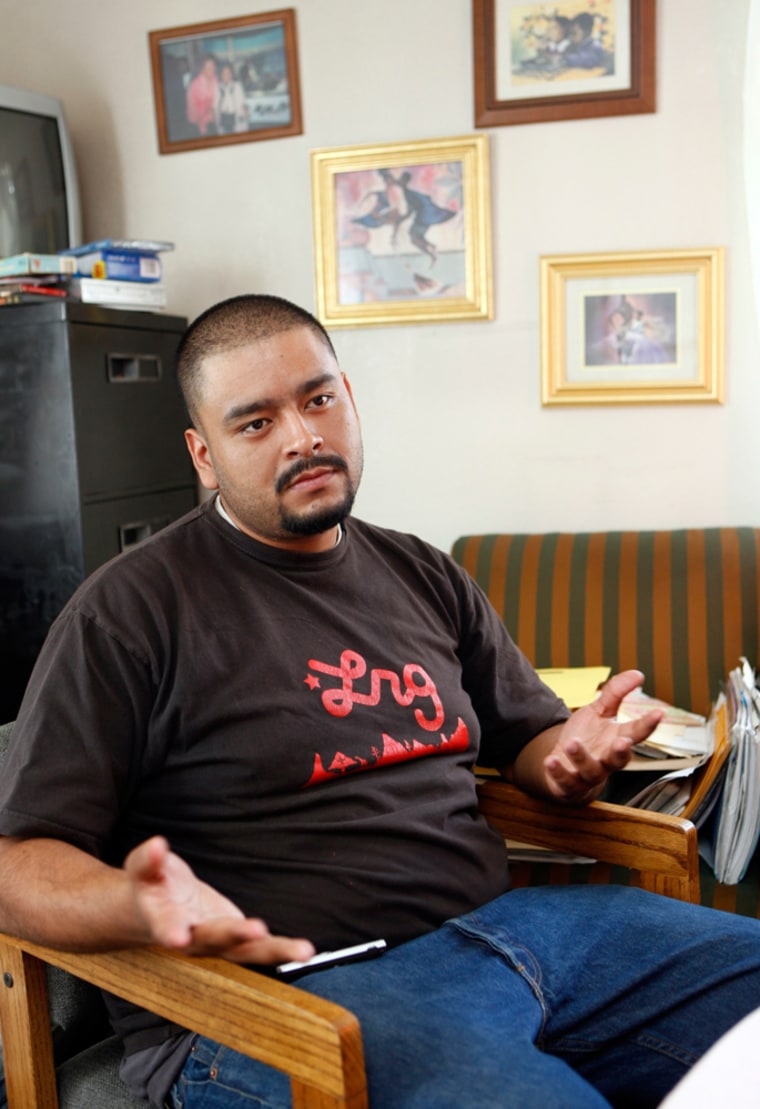Armed with little more than pen and pad, ACORN organizer David Mazariegos hits inner-city streets to save his embattled employer rather than his usual mission of saving homes from foreclosure.
Mazariegos approaches Jose and Maria Rodriguez on their patio surrounded by overflowing potted plants and a Virgin of Guadelupe statue and asks if they would speak at a news conference about how ACORN saved their house.
Maria Rodriguez doesn't hesitate.
"The only people who helped us were ACORN. We tried to negotiate with the bank, but they wouldn't listen," she says. "We paid $5,000 to a company to help us fix the loan. They took the money and didn't do anything."
As the nonprofit strives to survive the worst scandal in its 39-year history — videotapes of staffers counseling a faux pimp and prostitute how to run a brothel — the organization is doing what it does best: mobilizing low-income people. In this case, the goal is to restore the organization's credibility.
Rallying to the organization's defense
The mobilization effort is unfolding on several fronts. People like Rodriguez are being asked to speak up about how ACORN saved them. She and her husband also agreed to work a phone bank and bring five new people to the next community meeting. And ACORN officials say people are donating more money as they rally to the organization's defense.
"The truth is it broke my heart," Mazariegos said of the scandal. "But it doesn't faze me. It was just a couple people who did this, not the organization."
ACORN activists across the country say being the voice for the voiceless is the real story of their organization. That's why they refuse to buckle to what they see as right-wing detractors trying to bring down the group because it teaches poor people to stand up for themselves.
Their work continues, whether its stopping bulldozing of flooded homes in New Orleans, building housing for the working poor in New York City or protesting teacher layoffs in Los Angeles.
"Most of us have the understanding that we can't not do what we do," said Tanya Harris, the New Orleans chief organizer who was featured in Spike Lee's 2006 Katrina documentary "When the Levees Broke." "If we're taken out of the equation, what is to happen to those people? Who steps in there and fills that void in the way we've done? How are they heard?"
Fallout from the videotape scandal has been harsh. ACORN lost millions of dollars in federal funding and associations with institutions such as Bank of America and the U.S. Census Bureau. Several states, including California and Louisiana, are investigating the group's operations.
Charges of voter-registration fraud
In recent years, it has also weathered charges of voter-registration fraud and a $948,000 embezzlement by the founder's brother. But the widely broadcast videotapes, recorded on hidden camera, have damaged the organization's credibility, perhaps irreparably.
The scandal has shaken the group. ACORN has suspended its tax preparation service and housing assistance program. Foreclosure clients are now referred to counselors at the U.S. Department of Housing and Urban Development.
Yet the group continues to operate. Staffers are being retrained and procedures reviewed. Activists are working on other types of issues, such as the case of a New York City woman who says she was assaulted by a police officer.
They're also trying to drum up cash. Last week, headquarters sent a fundraising plea to field offices under the title "Will ACORN survive?" in a bid to make up the loss of some $2 million in government money. Most of the nonprofit's $25 million annual budget, however, comes from the 500,000 active members. They're asked to give $10 a month, but not all pay dues regularly.
People are responding, said Brian Kettenring, deputy director of national operations. He reported a huge outpouring of online donations, but said the dollar amount was not yet available.
In New Orleans, a woman walked into the ACORN office and donated a $100 bill, said Beth Butler, executive director of that city's chapter.
Community feels indebted to ACORN
Lower Ninth Ward resident Isaac Ray said the community feels indebted to ACORN for saving their neighborhood from a plan to turn it into wetlands.
"The city basically wanted to make this area green space and ACORN was the organization that stepped up and said, 'No bulldozing. Hey, people want to come home,'" said the former teacher. "We can bypass all the stuff we hear about ACORN because we know what ACORN has done for us as a community."
At the nonprofit's Brooklyn office, the waiting room is crammed with winners of a lottery for units in an ACORN-developed affordable housing complex in New York.
But it's far from business as usual in the office where two colleagues were fired for their infamous roles advising the impostor pimp and prostitute about evading taxes and smuggling in underage girls from El Salvador.
"It's frustrating when you work this hard," said Ismene Speliotis, executive director of NY ACORN Housing Co. Inc. "For one incident, your whole world goes topsy-turvy. It's really painful."
Nevertheless, the scandal has sparked a renewed sense of mission and more determination than ever, said lead organizer Jonathan Westin.
"The work we do is too important for this to stop," he said. "We will do whatever it takes to right the ship."
In Los Angeles, organizer Mazariegos stopped at the Watts home of Millicent Hall, a retired school teacher who said she's not about to retire her red ACORN T-shirt.
Surrounded by portraits of civil-rights heroes in her living room, Hall said her days working alongside Martin Luther King Jr. taught her not to give in to pressure.
"Back then, they were jumping off trucks and throwing rocks at us," the 69-year-old recalled. "It's same thing now, but it's politics. We keep on doing what we're doing and we usually win."
More on: ACORN
